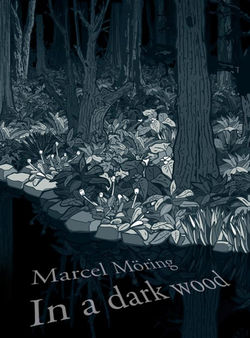Читать книгу In A Dark Wood - Marcel Moring, Shaun Whiteside - Страница 14
Chapter 8
ОглавлениеAnd then one day it’s the twenty-seventh of June 1980 and the sun shines on the road between the fields, the path Jacob Noah drives along, a tarmac path that lies there like a long grey ribbon thrown away by an old Drenthe giant who stood astride the land and decided that something had to be thrown away … a megalithic tomb? a forest? a whole village? no: a ribbon that passes through ash trees and hills, through heaths and sand drifts, river valleys and forests, and now here lies the ribbon, and in the sinking sun, there in the distance, on the viaduct, where the path rises, it becomes vague, vaguer and vaguer, until it dissolves into a grey road in the watery air of the west and Jacob Noah, who comes driving along the ribbon, rising and falling on the long swell of the asphalt, sees the country lying before him, the fields, the clumps of trees in the fields, the forests in the distance, the grey of the tarmac in between, and for a moment, less than half a second before he flicks up the indicator and pulls the steering wheel to the right, there is the almost physical urge to keep driving straight on, as if he could drive into the light in the distance, as if he could take off and he’d be away … released … (but what from? Him with his big car and his converted schoolhouse, his three gorgeous daughters and more money in the bank than he can spend in his lifetime) and for a moment in one all-encompassing gaze he sees the magnitude of the country, how fragile it all is, how wonderful and magnificent, it’s an experience that makes him literally sink back into the soft French springs of his DS, an experience that makes him long for the magnificent, the majestic, a feeling that makes him yearn to dissolve into the distance.
But he turns off. The car drives down the slip road and the sun, above the treetops in the distance, finds a hole in the thin cloud cover and suddenly and unexpectedly washes mightily over the car. The sharp light makes a haze of the windscreen. He shuts his eyes tight and the blood in his eyelids colours everything red. For a moment, and with bewildering clarity, a family photograph rises out of the red haze: him, Jetty Ferwerda, their three daughters; a photograph that was never taken because he didn’t want to be ‘captured’ in that way, but nonetheless he sees the picture sharp, framed, there’s even a bit of non-existent buffet in it, and he sees himself standing behind the girls, at the same time seeming to protect them (his body, his hands, everything) and keeping them away from his wife, and at that moment he suddenly knows that he has really done it, that he has kept them away from his wife and he also knows that he has never loved Jetty Ferwerda like the man who loves a woman because she is The Woman, but that she was the crank, the lever with which he lifted his daughters into the world, and as he grasps that he understands for the first time in his life, for the first time in sixty-one years, that he has never loved any woman at all, that he has never permitted such a thing, that he didn’t allow women to love him. He is alone. And he is alone because he wanted to be alone and he wants to be alone because he can’t bear someone else’s tenderness.
Whether it’s the sun shining into his face through the dirty windscreen, the power of memory or the sudden understanding of something that has decided his whole life, he doesn’t know, but his eyes sting and he feels the moisture welling up.
In the faint light everything is white and hazy in the car. The tyres sing, the engine growls comfortably.
Down at the slip road, almost weightless in the white light and blinking his tear-filled eyes, he changes down to second gear. The road is a grey path, the edge of the forest no more than a blurred green smear and the car that appears beeping harshly from the left something that shouldn’t be there.
The hazy white light in the car explodes. The treetops spin, he himself spins, the snowing glass of the windscreen spirals inside like a snowstorm and as everything turns and swirls and he is weightless for a moment, he sees again the photograph that he never had taken, and not just that one, but other photographs too, photographs that he doesn’t have, faces he can’t remember after half a lifetime: his mother, Heijman in his far too thick winter coat, his father at the dinner table with the ledger, Dr Wiegman’s red feet and the little yellow light in Aphra’s bedroom, Bracha’s hand in his much bigger hand, Chaja’s quiet eyes looking at him as her lips silently form a number.
